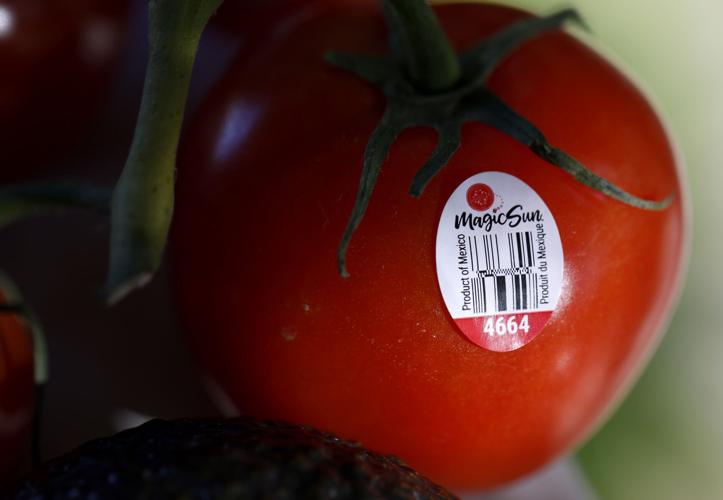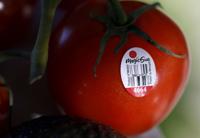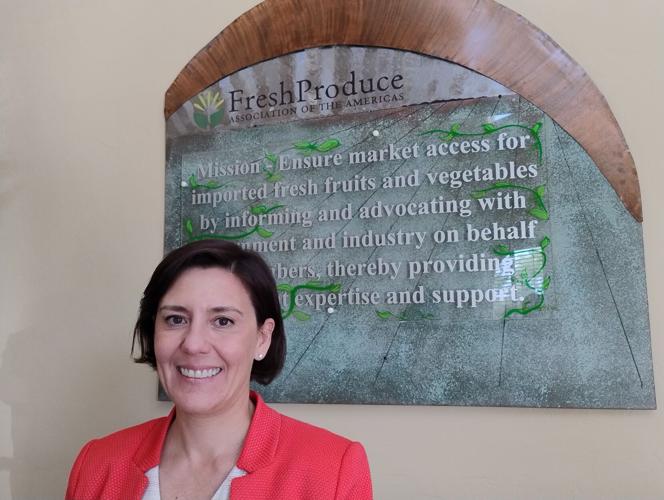
SAN ANSELMO, CALIFORNIA - MARCH 03: In this photo illustration, a tomato from Mexico is displayed on March 03, 2025 in San Anselmo, California.
Nogales, Arizona — Concerns continue to mount as the date for the United States’ intended withdrawal from its tomato trade agreement with Mexico nears, a move that could lead to higher costs for consumers and disrupt a supply chain that produces about 30,000 U.S. jobs.
On April 14, the U.S. Department of Commerce announced a 20.91% tariff on Mexican tomatoes following a 90-day period that could lead to the end of an agreement that protected U.S. producers from alleged unfair pricing by Mexican exporters.
According to Georgina Felix, director of operations and international affairs for the Fresh Produce Association of the Americas (FPAA), based in Nogales, Arizona, this announcement now creates uncertainty among Mexican producers as there are several possible outcomes from now until July 14.
“Strict enforcement of U.S. trade laws is a primary objective of the Trump Administration,” reads the statement from the department regarding the intent to withdraw from the agreement.
Although the initial announcement was 20.91%, it was later revised to 17.09%, Felix stated.
According to The World Bank, in 2023, the U.S. imported more than two million tons of tomatoes from Mexico, valued at $2.8 billion, positioning itself as the number one country supplying the product to Americans.
From 2015 to the present, according to Felix, between 90 and 93% of the tomatoes imported by the United States are from Mexico.
She also said that the value of tomato sales in general is estimated at $7.33 billion, and it is estimated that tomatoes imported from Mexico generate an economic impact of $3.64 billion.
“It's not just the consumer, but all the jobs, all the sales, taxes, transportation, logistics — the economic impact of imports is significant,” Félix stated.
In 2024, the border crossing through which the largest amount of fruits and vegetables were exported to the United States was Pharr, Texas, followed by Nogales, Arizona; Laredo, Texas; and Otay Mesa, California, according to FPAA data, which is made up of more than 100 U.S. companies dedicated to importing fresh fruits and vegetables from Mexico for distribution in the United States and Canada.
The tomato import issue takes center stage
The announcement by the Department of Commerce indicates that the United States intends to withdraw within 90 days from the Agreement to Suspend the Antidumping Investigation on Fresh Tomatoes from Mexico established in 2019. The decision was made following complaints from U.S. tomato producers, who claim they are not protected from unfair prices of Mexican imports.
A day after the announcement, Mexico's Secretary of Agriculture and Rural Development, Julio Berdegué Sacristán, addressed the issue at Mexican President Claudia Sheimbaum Pardo's morning press conference and explained that since 1996, Mexican exports of this product to the United States have been regulated.
If the department determines that dumping does exist, it establishes what's called a "countervailing duty," which isn't a tariff in itself, but more like a tax that Mexican producers must pay, he explained.
The Secretary of Agriculture projected the damage that imposing this type of tax on Mexican producers would cause. "Ninety percent of the tomatoes imported by the United States are Mexican. Six out of every ten tomatoes you eat there are produced here. If this measure is applied, your salads, your ketchup and everything else with tomatoes will be more expensive," he stated.

Georgina Félix is the director of Operations and Foreign Affairs at the Fresh Produce Association of the Americas in Nogales, Arizona.
According to Felix, among the possibilities of what could happen between now and July is that Mexican producers reach an agreement with the United States government, similar to what happened in 2019. But if the tax is applied, there could be a decrease in tomato volume, which could be reflected in a shortage, a spike in cost of the produce and a disruption of tens of thousands of jobs.
“In fact, the Department of Commerce has consistently found Mexican tomatoes in compliance with the Tomato Suspension Agreement,” a statement from the FPAA regarding the withdrawal from the agreement reads. “Since the implementation of mandatory quality inspections that Florida growers demanded under the 2019 Tomato Suspension Agreement, 99.992 percent of all tomatoes that must be inspected from Mexico have met or exceeded all quality requirements.”
Growers on both sides of the border await the department’s decision as the deadline nears.
Ongoing tariffs worry border community
The issue of tariffs has become more relevant today due to President Donald Trump's announcements of imposing new tariffs on products from other countries, such as Mexico and Canada.
Olivia Ainza, president of the Nogales-Santa Cruz County Chamber of Commerce, said that the tariff announcements generate uncertainty, but business sales in the border city have not been affected.
The Nogales Chamber of Commerce has 350 members, Ainza said.
“Talking to the managers of these stores, they tell me they compare their sales from the first quarter of 2024 with those from 2025, and they're almost the same. They haven't increased due to various factors, but they're still on par, which is very good,” she said.
However, there is mounting concern due to the potential for the lack of inventory, an issue that many U.S.-based sellers have encountered, given that many of the products they sell come from other countries, which would force them to pay import tariffs and pass along that cost to their clients.
César Barrón is an independent reporter covering the transnational communities of Ambos Nogales. He has over 20 years of experience covering the Sonoran communities.

















(0) comments
Welcome to the discussion.
Log In
Keep it Clean. Please avoid obscene, vulgar, lewd, racist or sexually-oriented language.
PLEASE TURN OFF YOUR CAPS LOCK.
Don't Threaten. Threats of harming another person will not be tolerated.
Be Truthful. Don't knowingly lie about anyone or anything.
Be Nice. No racism, sexism or any sort of -ism that is degrading to another person.
Be Proactive. Use the 'Report' link on each comment to let us know of abusive posts.
Share with Us. We'd love to hear eyewitness accounts, the history behind an article.